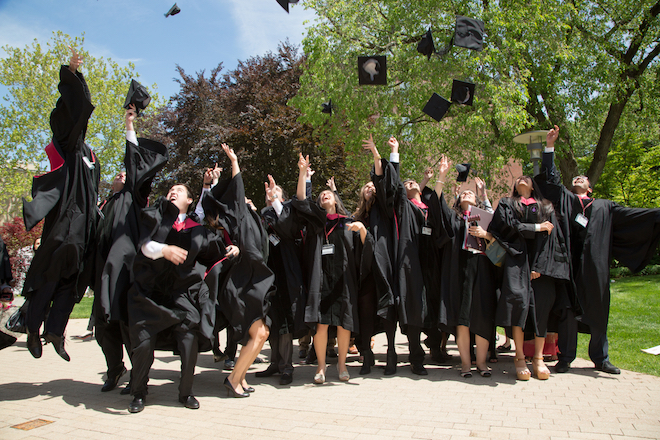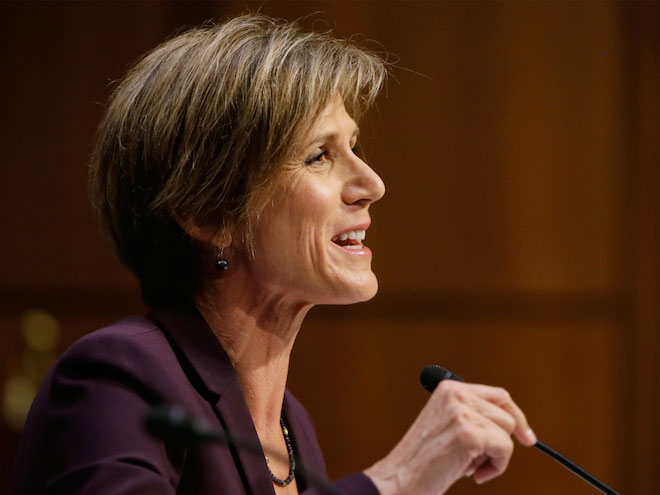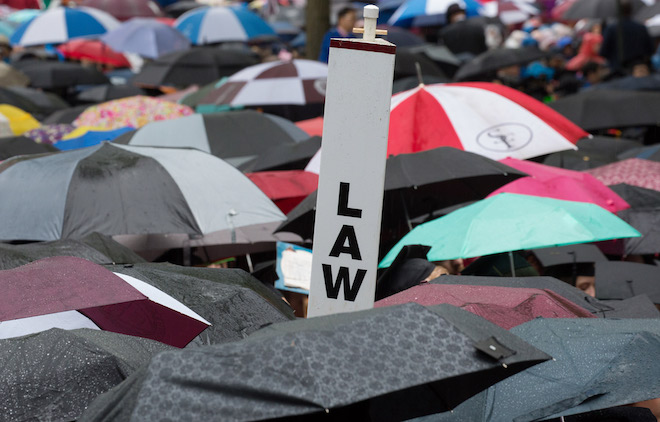Letter from Cambridge ... Hannah Ryan's Commencement edition ... Rousing calls to arms from Mark Zuckerberg and Sally Yates ... The rain ... Anxious parents ... Stocking crisis ... Farewell Harvard
 And then it was over
And then it was over
WHY do they call it Commencement, anyway? The program for Harvard's 2017 university-wide graduation extravaganza explains that it's from the Latin inceptio, and hails from a time when matriculation meant students could start teaching. But, I have some alternative theories.
One is that it refers to the brutally early start time on the day - meet at 6:45am for a sunrise breakfast, the email from Harvard Law School tells me, before we all march over to the Yard together, bagpipes in tow.
They don't mention that we'll wait outside Harvard Yard for two, cold and drizzly hours with naught to do but take selfies in every possible combination of students.
The beginning is the most exciting part of a day that seems never to end. Morning exercises, at which the president confers degrees en masse, are followed by a school-specific diploma ceremony, at which graduands walk across a stage, shake the Dean's hand and receive their degrees. Next comes the afternoon exercises, which include the commencement address. And Commencement Day is really the second day of the affair, as each of Harvard's schools hosts a "Class Day" the day before.
In this case, "commencement" might also refer to the onset of the rain, which set in just as the county sheriff declared the proceedings open and never stopped. The whole event took place outdoors on muddy grass, with fights nearly breaking out over umbrellas blocking views of the stage and proud parents covering their photo-ready outfits with ponchos.
There was a faint indignity in families flying from across the world to see their progeny graduate then finding themselves cowering under scarce trees and fleeing indoors as soon as they could. Too cold after the morning part of the ceremony, I dashed home to put on a pair of stockings, only to realise when I was preparing to receive my diploma that they clashed horribly with my regalia. With nowhere to put them, I rolled them up and stuffed them in my hat.
Another interpretation relates to the political careers that launch on the day. Our commencement speaker was Facebook founder Mark Zuckerberg. I wasn't keen on the choice: the man is responsible for creating a serious impediment to my ability to finish papers on time. And, as he dropped out of Harvard, this would be the first commencement he'd attended.
Then I saw the contradiction in writing Zuckerberg off as a terrible pick for speaker as I look at all those selfies we took before, now uploaded to Facebook, liking them and tagging people.
Rumours have been swirling online for some time that Zuckerberg is preparing for a presidential run, and I am sceptical of a man with so much power wading into politics. But this was the first time I heard a suggestion of what his platform might be.
Frankly, I expected it to be more terrible than it was: it took some leaves from the Sanders-Corby model (sans the charisma), with strong strains of Bill Gates and the tech-centrism you'd expect.
Repeatedly reminding the audience that he was a millennial (just like us!), Zuckerberg focused on purpose. Not his, or ours, but on creating a world where everyone has the freedom to pursue their own.
"We have a generational challenge," he told us, "to not only create new jobs, but to create a renewed sense of purpose."
Although platitudes were plentiful ("keep our society moving forward ... so we can all keep moving forward together") some more concrete proposals emerged.
"It's time for our generation-defining public works," Zuckerberg declared.
"How about stopping climate change before we destroy the planet, and getting millions of people involved in manufacturing and installing solar panels? How about curing all diseases and asking volunteers to track their health data and share their genomes? How about modernising democracy so everyone can vote online, and personalising education so everyone can learn?"
Creating purpose was about giving people the freedom to fail, he argued. As to wealth inequality, he noted that there was "something wrong with our system" when he was a billionaire dropout and many students couldn't afford to pay off their loans.
Unlike the other speakers on the day, he acknowledged the role luck had played in bringing us all to Harvard. He invited us to explore universal basic income. He advocated for affordable childcare. He's in favour of continuing education and against the carceral state. In his embrace of globalisation, he made his opposition to the current president abundantly (if not explicitly) clear.
"And yes, giving everyone the freedom to pursue purpose isn't free. People like me should pay for it. Many of you will do well and you should too." (Muted applause followed.)
"His speechwriting team did a great job," I muttered to my mother afterwards. She chided me for my cynicism. "He wrote that himself! Those tears in his eyes at the end weren't fake."
If he does run for office, Zuckerberg may face competition from the law school class speaker Sally Yates. Or at least that was what we all took from the former acting attorney general's address, delivered with a warm southern twang.
Yates, an Obama appointee (whose Harvard Law School address on criminal justice reform I covered for Justinian here) told us her story of a decision to be made where the law and conscience intertwined.
Her chief of staff had advised her to expect "a lot of long, boozy lunches" as she held the reins at the Department of Justice while the Trump administration awaited the confirmation of Jeff Sessions. Then one Friday afternoon she found out about the travel ban - from media reports. Seventy-two hours later, she directed DOJ not to defend the ban in court. Shortly after that, she was fired. At this point in the story, the only people not cheering were the two men in TRUMP hats loudly booing.
 Sally Yates: class day speaker on the topic of law and conscience
Sally Yates: class day speaker on the topic of law and conscience
"You never know when a situation will present itself in which you will have to decide who you are and what you stand for ... The time for introspection is all along the way, to develop a sense of who you are and what you stand for. Because you never know when you will be called upon to answer that question."
Yates wasn't shy about telling us what she stood for, concluding with what resembled a rousing campaign stump speech:
"For me, it's criminal justice reform - so that we can have a fair and proportional criminal justice system that applies equally to all regardless of race, wealth or status. It's also respect for the brave men and women of law enforcement who put their lives on the line to protect us. It's holding corporate executives who break the law accountable so that cheating and stealing doesn't become just a way of doing business. It's the right of all Americans to marry the person whom they love, regardless of whether they are the same or opposite sex. It's the rule of law, and the principle that our law enforcement and intelligence agencies must be free to do their work without political interference or intimidation."
Even the Harvard Law professors got into the swing of it, with Professor Mark Wu accepting a teaching award with a searing speech that earned him a standing ovation.
The interpretation of "commencement" that I favour is about what comes next. Graduation marked the start of the time after university, the scary emptiness and the heavy responsibility to go and do something good.
For all of us gathered in the Yard, whooping and cheering as the president conferred our degrees, Harvard had been a dream we'd worked towards for years, then a blistering, brilliant reality, and then it was over. Now to go out into the real world.
 The dream is over
The dream is over